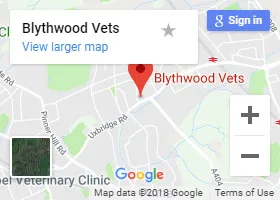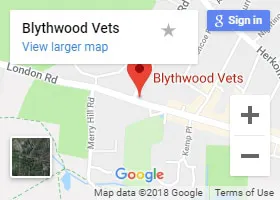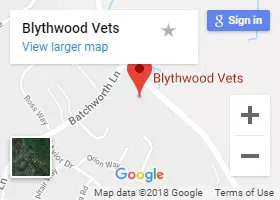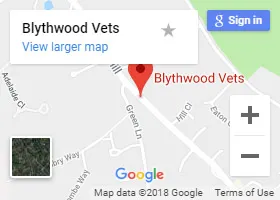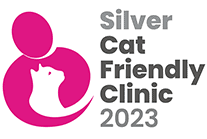Is your older dog or cat aged eight or above? Help them live happier and healthier lives in their later years with regular check ups
As our pets get older they are prone to certain health conditions that are linked with age, just like us humans.
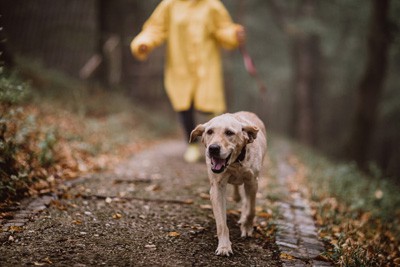
The main difference is that they are unable to tell us if they are not feeling quite right and, in some cases, our pets are quite good at hiding the signs.
As we face the colder months, some conditions in older dogs and cats can be more prevalent during this time. It’s especially important to ensure your senior pet has regular check-ups with the vet so we can spot the signs of any concerns sooner.
Do you know how to spot the signs of some of the most common diseases affecting our older dogs and cats?
At Blythwood Vets we’ve pulled together some advice and a few things to look out for below. We’re here to help your older dogs and cats live their happiest and healthiest lives, whatever their age.
Arthritis in dogs
In older dogs, the years of wear and tear on the joints can cause them to become inflamed – resulting in movement becoming sore and difficult. Osteoarthritis, or arthritis as we commonly know it, is usually prevalent in the hips, elbows and knees, but can appear in any joint.
Spot the signs:
- General slowing down, especially on walks
- Reluctance to play, jump or go upstairs
- Limping/lameness
- Muscle wastage
- Licking or chewing the skin over affected joints
- Stiff walking motion (especially when waking up or after exercise)
Heart disease in dogs
There are many different heart conditions that can affect our older dogs; however, mitral valve disease (MVD) is by far the most common. But what is MVD, and how do you know if your dog has it?
Also referred to as degenerative valve disease, MVD involves the degeneration of the heart valve separating the two chambers on the left side of the heart. As a chronic, progressive disease, it will worsen over time.
Symptoms of MVD may not display easily and in some cases, affected dogs can live their entire lives without showing any signs of the disease. The main symptom for diagnosing MVD is the presence of a heart murmur – this will only be picked up during a routine examination by one of our vets who can listen to your dog’s heart.
Spot the signs:
- Coughing (after lying down or sleeping, and often worse at night)
- Slowing down on walks or displaying low energy in general
- Breathing quicker than usual, with breathlessness and/or panting
- Weight loss
- Fainting or collapsing.
If in any doubt, it is always best to get your dog seen by us. On detection of a heart murmur, further tests may be required to confirm the diagnosis.
There are several different heart diseases that can affect our older cats too; however, cardiomyopathy is the most common. But what is it and how do you know if your cat has it? The term cardiomyopathy covers any disease that affects the heart muscle. There are different types of cardiomyopathies and they are classified according to the effect they have on the function of the heart muscle.
Spot the signs:
- Breathing difficulties/rapid breathing
- Cold extremities, suggesting poor circulation
- Signs of fainting (although relatively uncommon).
Symptoms of heart disease may not display easily. Therefore, it is important to ensure that your cat has regular check-ups with us so that any early signs of heart disease can be detected and treated accordingly. We may be able to pick up on:
- A heart murmur (listening to your cat’s heart using a stethoscope)
- A gallop rhythm (where an additional third beat is heard with each contraction cycle)
- Increase or decrease in heart rate.
If in any doubt, it is always best to get your cat seen by us. On detection of a heart murmur, there may be further tests required to confirm the diagnosis.
Kidney disease in older dogs and cats
Your pet relies on its kidneys to perform important tasks such as removing toxins from the blood, preventing water loss and regulating blood pressure and acidity levels. When older dogs and cats are not able to perform these tasks properly, this condition is known as kidney failure (or renal disease). Age can be a factor in developing kidney disease, with symptoms and severity differing greatly between cases.
Spot the signs:
- Excessive drinking leading to frequent urinating
- Diarrhoea
- Vomiting
- Weight loss
- Loss of appetite
- Ulcers in the mouth
- Sudden blindness due to high blood pressure
High blood pressure in older cats
Although high blood pressure can occur on its own, the commonest causes are kidney, heart and thyroid disease. As the body is working harder to circulate blood, this can lead to complications with the kidneys, eyes, heart and even the brain.
Spot the signs:
- Blindness
- Weight loss
- Noticeable changes inside the eye, including bleeding
- Seizures
- Disorientation
- Change in personality
Cushings disease in dogs
Dogs with Cushing’s syndrome produce excessive amounts of cortisol. This can have harmful effects on other organs and on the ability of the body to regulate itself. Cushing’s occurs in dogs who are producing excessive amounts of cortisol, an important hormone that helps to regulate the body’s metabolism.
Spot the signs:
- Large water intake
- Frequent urination and possible incontinence
- Ravenous appetite
- Pot belly
- Thin skin
- Hair loss or recurrent skin diseases
- Muscle wastage
- Lethargy
- Excessive panting
In all cases, it’s important to ensure that your pet has regular check-ups with us at Blythwood Vets. If you are concerned that your pet may be showing any signs or symptoms mentioned above, then please contact us for a health check.
Spread the cost of essential healthcare for your senior pet

To spread the cost of routine and essential healthcare for your pet, we offer our Pet Health for Life plan, which includes an annual health check.


